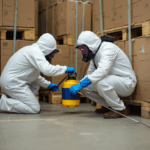From GPS routing to remote monitoring, today’s pest control companies use tech-driven strategies that prevent problems before they spread
Key Takeaways:

- Modern pest control for businesses has shifted from reactive treatments to proactive prevention, utilizing regular inspections, strategic exterior treatments, and ongoing monitoring to safeguard brand reputation, ensure regulatory compliance, and prevent costly infestations.
- Advanced technology plays a significant role in modern pest control, with remote monitoring devices providing real-time alerts of pest activity in high-risk areas, and mobile reporting/analytics offering businesses digital access to service logs, trend tracking, and audit documentation.
- Contemporary pest control emphasizes targeted treatments, not general sprays; these precision applications are specific to the pest, environment, and infestation stage, exemplified by outdoor-only solutions for mosquitoes, yellow jackets, and brown recluse spiders, aligning with safety and environmental standards.
- Industry-specific strategies are crucial in modern pest control, as leading companies customize programs based on building layout, industry regulations, regional pest commonality, and seasonal pressures, moving away from one-size-fits-all approaches.
- Effective modern pest control extends beyond treatments to include educating staff and facility managers on pest recognition and risk reduction, empowering them to support professional efforts in preventing infestations and maintaining a pest-free environment.
For businesses, pest control is no longer just about responding to infestations – it’s about proactive strategies, smart technology, and integrated approaches that align with today’s operational demands. Whether you’re in food service, healthcare, property management, or manufacturing, modern pest control has evolved into a critical part of maintaining brand reputation and regulatory compliance.
The old ways of pest control relied heavily on reactive treatments and general sprays. Today’s leading commercial pest control companies offer solutions that are faster, smarter, and far more precise. With advancing technologies and shifting business expectations, knowing what to look for in a modern pest control provider is more important than ever.
The Shift from Reactive to Preventive Pest Management
Traditional pest control often meant waiting for a problem to appear before taking action. But today’s businesses can’t afford to wait. A single sighting – whether a yellow jacket at a restaurant patio or a cockroach in a break room – can trigger customer complaints, health code violations, or worse, viral social media backlash.
Modern pest control focuses on prevention. That means regular inspections, strategic outdoor treatments, and ongoing monitoring to stop infestations before they start. For companies dealing with aggressive or seasonal pests, this approach protects not just their property, but also their brand’s public image.
This is especially critical for industries like:
- Restaurants and hospitality
- Food processing and packaging
- Healthcare facilities
- Schools and daycares
- Warehousing and logistics
These businesses need more than just service – they need a pest control company with industry-specific strategies and quick service capabilities.
Smart Tools and Technology in Pest Control
Just like every other industry, pest control is becoming more data-driven. From the use of advanced sensors to digital reporting tools, technology now plays a major role in how effective treatments are designed and delivered.
Remote Monitoring Devices

Many modern pest control companies now install monitoring devices that track pest activity in real-time. These tools send alerts when there is motion or activity in high-risk areas, such as near dumpsters, loading docks, in outdoor break areas, or in sensitive areas that are under lock and key.
This allows technicians to respond quickly and adjust treatment plans without waiting for a visible infestation to take hold – and only when necessary.
Mobile Reporting and Analytics
Digital platforms now allow business owners and facility managers to review inspection results, service logs, and technician notes from any device. These mobile dashboards make it easy to:
- Track pest trends over time
- Monitor treatment results
- Access service documentation for audits and inspections
If you’re looking for a pest control company near me, be sure to ask if they offer digital reporting and real-time analytics.
GPS-Enabled Route Optimization
For technicians, route optimization tools ensure faster response times and efficient scheduling, which is especially valuable for multi-location businesses. These systems prioritize calls based on urgency and technician proximity, reducing downtime and helping businesses get back to normal faster.
Importance of Industry-Specific Strategies
Not all businesses have the same pest risks. A healthcare facility requires different strategies than a warehouse or a senior living community. That’s why a one-size-fits-all plan won’t work in modern pest control.
Leading pest control companies customize their programs based on:
- The layout of the building and property
- Industry regulations and audit requirements
- Types of pests most common in that region and business sector
- Seasonal pressures and climate variables
- Additional service needs such as professional disinfectant for your business to support cleanliness and safety following pest activity or as part of a proactive sanitation plan
At OPC Pest Services, for example, pest management plans are developed with the help of Board Certified Entomologists and tailored for specific industries. That includes outdoor stinging pests for hospitality, rodents for restaurants, and flies for food processing, each with their own treatment plan and monitoring schedule.
The Role of Education and Staff Training
Technology and treatments are only as effective as the people using them. Modern pest control includes educating staff and facility managers on how to recognize early signs of pest activity and reduce risk factors around the property.
Businesses benefit when their teams understand:
- What attracts pests (trash, standing water, stagnant water features, overgrown landscaping)
- How to identify entry points
- Why consistent outdoor maintenance matters
A well-informed team supports the work of the pest control company and helps prevent future infestations.
What to Look for in a Modern Pest Control Company
Choosing a provider isn’t just about price or location anymore. If you’re searching for a pest control company near me, be sure to evaluate providers based on their ability to meet today’s (and even tomorrow’s) expectations, not yesterday’s.
Here’s what to look for:
- Outdoor-only treatment expertise (no indoor service distractions unless you need them)
- Technicians who are trained, certified, and experienced
- Use of professional products and no foggers
- Monthly treatment options, especially for mosquitoes and yellow jackets
- Customized plans by pest type and industry
- Digital reporting tools and real-time service logs
- Bioremediation services to address organic buildup in outdoor drains and reduce fly and cockroach breeding zones
- Availability of year-round support and quick, local services
Whether you’re managing a single building or multiple properties, your pest control provider should act as a strategic partner, not just a service vendor.
Pest Control is an Essential Business
In today’s competitive environment, pest control isn’t optional – it’s a crucial part of running a safe, clean, and compliant business. Whether you operate a restaurant, healthcare facility, warehouse, or retail location, pests can hurt your reputation and bottom line faster than ever.
If you’re searching for a pest control company near me, don’t settle for outdated tactics or generalized treatments. Choose a provider that understands the technology, tactics, and industry requirements that shape modern pest control.Contact OPC Pest Services for a free quote and learn how we help businesses stay ahead of pest problems – with expert services, quick response times, and the right tools for the job.